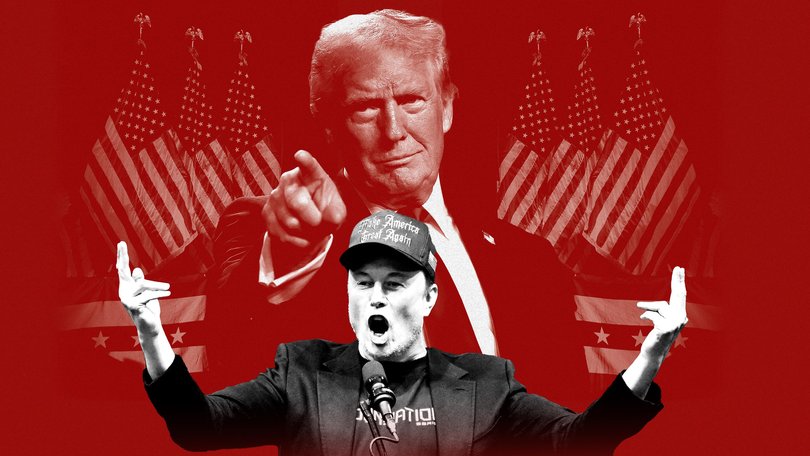THE NEW YORK TIMES: The alarming part of the Musk-Trump dispute
At the height of the juvenile flame war on Thursday between the world’s richest man and its most powerful one, US President Donald Trump posted a barely veiled threat on his website, Truth Social.

At the height of the juvenile flame war on Thursday between the world’s richest man and its most powerful one, US President Donald Trump posted a barely veiled threat on his website, Truth Social.
“The easiest way to save money in our Budget, Billions and Billions of Dollars, is to terminate Elon’s Governmental Subsidies and Contracts,” he wrote.
“I was always surprised that Biden didn’t do it!”
Sign up to The Nightly's newsletters.
Get the first look at the digital newspaper, curated daily stories and breaking headlines delivered to your inbox.
By continuing you agree to our Terms and Privacy Policy.All the tech oligarchs and business titans who’ve thrown in with Mr Trump, apparently deciding that strongman politics are good for business, should think carefully about that post. In it, you can see the transition to a new kind of American regime.
Until approximately six months ago, business leaders did not have to worry that voicing their opposition to an American president could tank their enterprises.
Now, it’s widely understood and even tacitly accepted that the president will wield the power of his office to crush his enemies. That’s why stock in Musk’s electric car company, Tesla, plunged while he fought with Mr Trump, losing, astonishingly, about $150 billion in market value on Thursday.
It’s true, of course, that in Joe Biden’s administration, Democrats regulated big tech in ways that industry honchos resented. But Lina Khan, the former chair of the Federal Trade Commission, and Gary Gensler, former chair of the Securities and Exchange Commission, were motivated by policy goals, not personal vendettas.
It’s also true that many of Musk’s customers turned on him over his lurch to the far right, which hurt Tesla’s business. But there is a profound difference between ordinary people rejecting a brand that doesn’t align with their values, and a president using the levers of the state to enforce loyalty.
Musk could say whatever he wanted about Mr Biden without risking the government contracts of his company SpaceX. Perhaps he attributed that freedom to his own power and indispensability.
In fact, he owed it to liberal democracy and the very bureaucratic, technocratic structures that he’s spent the last few months trying to destroy.
It’s still too early to know whether Musk’s rift with Mr Trump will be permanent. As I write this, Musk has backed off his online attacks; in response to a social media post by hedge fund manager Bill Ackman urging a rapprochement late Thursday, Musk wrote, “You’re not wrong.”
Nevertheless, the last 24 hours should be a lesson to both him and all the other billionaires who lined up with Mr Trump. In trying to liberate themselves from regulation, they’ve trapped themselves in a posture of deep, even existential submission.
When the rule of law gives way to the cult of the leader, there are lots of opportunities for personal enrichment, but only for those who stay in the leader’s good graces.
“Americans tend to think that being rich makes you powerful,” political scientist Jeffrey Kopstein, co-author of “The Assault on the State,” told me recently.
“In fact, what the Trump era is showing is that being powerful makes you rich.”
In the world Musk and his Silicon Valley allies have helped usher in, supplication is as important for major entrepreneurs as innovation. Musk, perhaps, deserves to have to live in this world. The rest of us don’t.
This article originally appeared in The New York Times.
© 2025 The New York Times Company
Originally published on The New York Times
